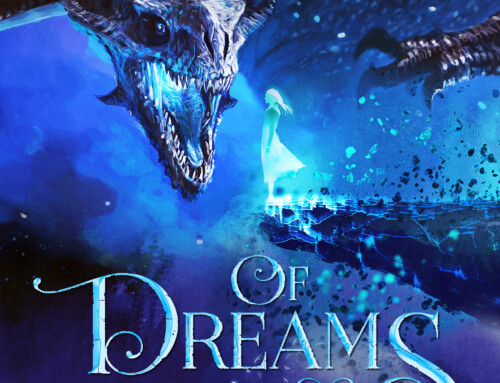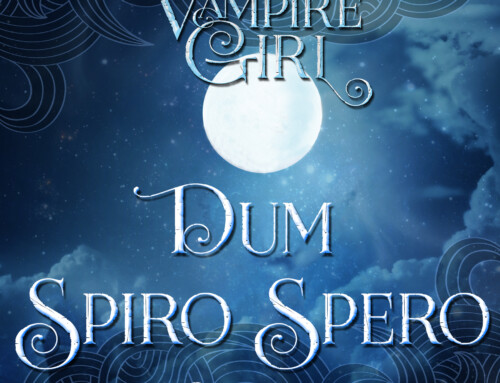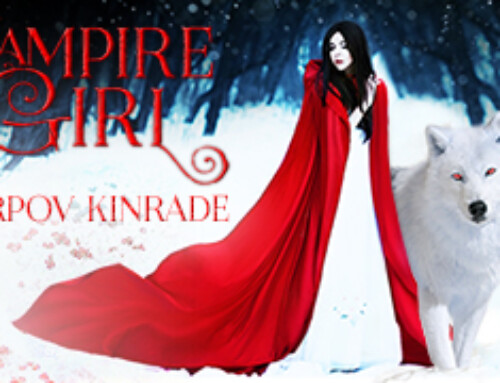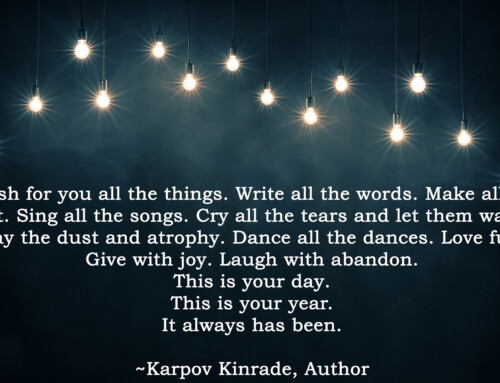 We were readers before we were writers, and we continue to read voraciously, as every writer—nay, every human—should. So we know what it feels like to become emotionally attached to fictional characters and their plights. We know how it feels to read something that makes us angry, sad or despondent. We also know how it feels to read something that makes us cringe and wish we could rewrite it with a different ending.
We were readers before we were writers, and we continue to read voraciously, as every writer—nay, every human—should. So we know what it feels like to become emotionally attached to fictional characters and their plights. We know how it feels to read something that makes us angry, sad or despondent. We also know how it feels to read something that makes us cringe and wish we could rewrite it with a different ending.
And so we write our own stories the way we would tell them. The way the people in our heads dictate them. We write for us first, and then we hope you, dear readers, also love the people who have created themselves in our minds.
It used to be, before the interwebs, that this was enough. A writer would write and a reader would read and never the two shall meet. Now, not so. Now, social media, and online reviews and the internet have given readers a voice to not only meet and engage in dialogue with their favorite authors (Kimberly still has the tweets starred that she and Neil Gaiman exchanged), but readers can voice their opinions about the books they read. They can take those emotional journeys online and en masse.
This has some real perks. Those connections, making reading a group experience to share with friends and family, getting to know your favorite author more personally, sharing your favorite books far and wide—all awesome!
But there is one trend we noticed first with video games, and now with books, that we have to wonder about.
Recently, we’ve seen a few popular authors receive major heat for the way they ended their popular series. (And in one case, the criticism is for choices the author has made in the series as it progresses.)
Laurell K. Hamilton, popular, bestselling author of the Anita Blake books, wrote a post years ago about her negative readers. The ones who would wait in line for hours during a signing just to tell her they hate her books.
We are scratching our heads at people who would spend SO MUCH TIME and ENERGY to hate on something. Don’t like it? DON’T READ IT!
So obviously, getting passionately…. Er… passionate about a series isn’t new. What’s new (at least what SEEMS new-ish) is this tendency to blacklist authors because of a choice they make in their books, or even because of the style of book they write.
Fans of Veronica Roth are livid over the ending of the Divergent series. Allegiant just launched and already it has a 2.5 rating with  over 177 1 star reviews. Many are saying they will never read anything by this author again, because of how she ended the series.
over 177 1 star reviews. Many are saying they will never read anything by this author again, because of how she ended the series.
Fans of the Sookie Stackhouse series went crazy when Charlaine Harris gave Sookie the ‘wrong’ happily ever after, going so far as to send death threats, suicide notes and more to the author, who canceled her book tour.
We understand that the characters in books become real to readers. WE ARE READERS and WRITERS. The characters we read and write are all real to us. But there has to be a line drawn somewhere.
At the end of the day, the author is THE AUTHOR. They, and only they, have exclusive access to the voice of their characters and storyline. Both Harris and Roth said in interviews that the ending for their series were known from the beginning, because sometimes that’s the way the muse speaks.
I, as the reader, may not like it, but it’s not my book to write.
But it’s not only the endings that are getting authors blacklisted by readers these days. H.M. Ward, author of the New York Times Best Selling serial novel, The Arrangement, has garnered a lot of criticism from fans for her serial approach to this series, many of whom have threatened to ‘never read this author again.’
That’s of course their decision, but that seems harsh and a little alarming.
Firstly, Ward has other books out, full length books that are not serials. Secondly, her serial is clearly marked as such, with word count and everything, so if serials aren’t your thing, DON’T BUY THEM!
Which brings us to the third point. There is a DANGER to this way of thinking from fans.
Let’s say authors listen to this craziness and start changing their writing style and book endings and formats to appease the most negative vocal readership they have. What would happen?
The death of innovative literature. THAT is what would happen.
Perhaps you think we’re being alarmist, but hear us out. We, as authors, need freedom to tell the stories that are in us to tell. We may write in different genres, different lengths and story types, with different kinds of endings. We may experiment with dark characters or fun characters or a blend of both. We might push the envelope on topics that make you uncomfortable. We might *gasp* have endings that are more tragic than happy. We might write books that are just not for you.
And that’s okay. We don’t expect every fan we have to read every book we write.
But if we as authors (in the larger sense of the word), listened to this kind of criticism, and started writing for the vocally negative, then all that innovation would stop. We would start to write in ruts, only content to repeat the tried and true story ideas, lengths and formats that received the least amount of criticism.
We wouldn’t venture forth with new ideas.
We wouldn’t innovate.
We wouldn’t try new things.
And we would become stale.
Boring.
Trite.
Trust us when we say that nobody wants to live in a world where this kind of writer is the only one writing.
So might we make a suggestion? Instead of shaming authors in reviews, instead of threating to ‘never read this author again’ because they violated something in the length of their story or ending of a series that was important to you, perhaps take each story as its own, each book as its own.
It’s okay to hate a book, or hate serial novels, even, but unless that is the ONLY THING the author has ever written and ever will write, why vow off the author forever and always? Why not support the author in making different choices for different books, depending on what they feel the story calls for?
Why not allow the author’s muse to speak to them, and decide based on each book whether it’s something you’ll enjoy or not?
Because the last thing we want to do is create a society of writers who stop listening to their muse and start listening to the angriest, most vocal of their readers.





I agree wholeheartedly that it’s the author’s story to tell and they should tell it in their way, something which I blogged about a few weeks ago (http://www.claredavidson.com/blog/1821-writing-without-compromise).
As a reader, I wouldn’t stop reading everything from an author just because I didn’t get on with one book, especially if I’d enjoyed other things they’d written.
Thanks for sharing your blog! 🙂
You make many good and valid points here. 🙂
Personally, I stop reading an author if I feel that that author has betrayed my trust as a reader – by which I mean that I feel that they have broken the “unwritten contract” with the reader.
I can give you an example: a while ago, I was reading a novel, and enjoying it, right up to about half way through – when it suddenly became a different story entirely. I mean, we all know that there needs to be a midpoint context shift – but this went way beyond that. I felt that the author had led me along deliberately to expect one kind of story, and then cheated me. So I have never trusted that author again to supply me with a satisfying story.
Now, I happen to know that lots of people LOVE this author, and even this specific book. Fair doos. If we were all the same, it would be a very dull world. 🙂 But for me personally, that isn’t the kind of ride I’m looking for.
What I can’t comprehend is people who hound authors in the way your article describes. I agree with you: If you don’t like it, just don’t read it. 🙂
That makes sense, Ruth. And is a valid point I agree with 🙂
There are several points in this article I agree with, but there are a couple things, one especially, that I’m not sure I’m “on the same page” with here…
“If you don’t like it, don’t read it!” IF you are saying, “don’t read it again,” then yes. However, how do you KNOW that you won’t like it, if you DON’T read it? It would irk me a LOT more for someone to hate on an author’s writing who hasn’t even read the book.
And, yes, “hating” on an author is extreme and un-called for. The “death threats” are seriously disconcerting and disturbing. It is an author’s prerogative to write the story as they feel it needs to be written and/or as the characters dictate. On the same token, it is the reader’s prerogative to voice their displeasure with the story in whatever form that comes – whether it be the “mechanics and technicalities” in the writing or the way the story played out.
Obviously, there is an appropriate way to address it and then there is just petulance. Of course, you must also consider the target audience – YA. Many of these are teens or barley older: young, emotional, and often hormone driven. Just as several have commented “Well, what did you expect?” in regards to the book’s conclusion (seems some felt it obvious, even necessary) to which I could say the same. What do you expect from a YA audience, especially one hyped up with as much media attention as this story has garnered? The fandom has been built up to a fever pitch over the past year only to be, as they seem to have obviously voiced, let down and there is no one else but the author who is ultimately going to receive the brunt of that dissatisfaction.
A reader is going to be true to the type of story they want to read (after all, it is their time and money to spend as they wish) just as much as many authors need to be true to the their characters in the story they’re writing. Both sides have things to accept and choices to make. An author who needs to tell a difficult story and does it to stay true to the characters, and/or the “moral or lesson” they wish to convey, or even just because the character’s voice in their head gives them no other choice must be prepared to accept that some readers are going to be upset and are going to let you know it. Some authors choose to write what “sells” because it’s a career and they want to stay true to their fans, their customers, the ones who make them successful. Others are writing because it is the story, first and foremost, that is a priority over the sales, reviews, or being “popular.” I don’t see anything wrong with either of those methods, so long as the author accepts the consequences of whatever direction they choose and that’s what makes them feel good about what they’ve done at the end of the day, despite contrary opinions.
Now, for me personally, I feel let down by the poor portrayal of the alternate POV’s (I was one of those that had a very hard time keeping up with which “head” I was in) and lack of originality vs. the first two books (it seemed like the same story told from a slightly different perspective), which made the end feel like it was written for “shock value” in order to make up for the ho-hum pace and absence of page-turning action throughout the rest of the book. I’m not saying that was the case, obviously I can only speculate what was in the authors mind. Regardless, that is the way it “felt” to this reader. Not only that, it felt so pointless… there wasn’t anything revolutionary or thought-provoking that gave comfort and purpose to the pain you felt reading the end. One of my favorite movies is “Pay It Forward” which ends in the death of the main character, and a child at that. It even ends just when everything seems to be looking up for the little guy. It ripped my heart out, but it replaced that pain with hope, understanding, and “awe” at seeing just exactly how far-reaching the actions of that character were. Just writing about it now gives me chills. Allegiant was nothing at all like that. I don’t feel like it would have taken much to show the effect and impact the sacrifice here had on the world, not just one character. I suppose I’m just as disappointed for all the possibilities and promise it had, but didn’t take advantage of. I may have missed the author’s point, but the author’s point is lost without more definition for those who don’t have those characters inside their head/heart and need a little more detail to “get them there.”
But, your question was, does one “bad” (obviously subject to opinion and interpretation of the individual reader) book make an author deserving of being blacklisted? IMHO, no, not blacklisted. Like I said before, you can’t make assumptions about a book before you’ve read it. But, will it make me think twice about reading that author’s material the next time? Absolutely. Will I go searching and make it a point to keep up with that author’s future publications, salivating for the next one? Obviously not. ESPECIALLY for a newly emerging author. This isn’t an author that I’ve been reading and loved so many of her books and she just had a “flop” in there. I’m not going to completely “write off” Veronica Roth, but I’m not going to be anxious for her either.
What I meant, specifically, by ‘don’t read it’ was directed more specifically at those fans of Hamilton who would read the books even though they hated the direction the series had gone, then spend hours waiting in lines at signings to criticize her for it. That’s an ongoing series that you may or may not enjoy the direction of, or the choices of the main character, but it’s been going that way for a long time. Stop reading it if you don’t like it!
I also meant that in terms of serials. There is HUGE criticism levied at some authors who write serials (10k novella length stories as part of a series, often with cliff hanger endings). But the thing is, every serial I’ve seen criticized has made it VERY CLEAR in the product description what it is, how long it is, and often even if there’s a cliff hanger ending, but people still buy it and complain about the format. If you know you don’t like cliff hangers or serials, then my strong suggestion is DO NOT buy a cliff hanger or serial book. If it somehow doesn’t say it in the product description, it will likely mention it in reviews, and you can also see the length of the book based on the pages (even for Ebooks). If you buy it without paying attention to the product description, then don’t complain when it turns out to be something you don’t like. (And by ‘you’ I mean the readers who are guilty of this.)
I agree that if it’s a book you haven’t read, or a series you’ve liked but the last book is disappointing, then of course you can’t know if you’ll like it until you read it. But I get more upset when someone buys something they KNOW they don’t like (i.e. serials or cliff hanger endings), then leave horrible reviews complaining about that one thing even though they liked the rest of the book. Now, if an author doesn’t give ANY indication that’s what the book is, and there aren’t any reviews about it, okay then, I understand. But I know we work HARD to make sure that if you read the product description of ANY of our books, you know how LONG a book is, if it’s part of a series or serial and even if it’s stand alone or has a cliff hanger ending. We want you to buy our books knowing what you’re getting so you know what to expect.
I already answered this on Facebook, but… well, as stated above by Ruth, you make some valid points. I totally believe that an author should be the captain of their own ship, where ever that ship may take them. However, as Ruth mentioned, there is certain type of non-written contract that an author will be honest and open about their writing. If I read a romance, I’m expecting a romance, and a romance has a HEA. If it’s part of a series, then that might take a while to happen, but it still does, and while we’re getting there some bad things can happen. I acknowledge this. The problem I see is when an author sells out to make the $$$. When the writer changes his/her modus operandi and after 10 books, the general formula you are used to seeing isn’t there and the story suffers. I had a book that I and many others were looking forward to – waited a long time for this particular love story – and the book was not written as the love story it should have been because the author was afraid of the fall out. Then, the announcement of the next book and subsequent books, instead of continuing with storylines that this author started, the author appears to be starting over. In addition, there was a signing event, and when I heard how it was being handled, it was ridiculous. It was all about making more sales and more money. I have met some totally amazing authors that go that extra mile for us their readers, and in many of the cases at no cost for the readers. With these events happening one after another, I’ve decided that I’m not interested in giving this author any more of my money. I reviewed the last book – it was an honest review. Her writing was technically impeccable as always,but it was not the story I paid for or expected. As for someone like Harris, no I did not agree with Sam for Sookie (he’s like her brother – EW), but as you said it wasn’t my story to tell. I was not mad at Ms. Harris for this. I won’t be buying the last book she is putting out for the series, because I don’t feel the need, not because I don’t agree with this ending. There were several times I didn’t agree with the direction of that series, it was still a good series. I think everyone is allowed to like or not like, but agree that there is a point where a reader needs to realize that they are able to spend their dollars elsewhere.
Each author will find their audience and each reader will find their author.
So, authors keep writing the stories from your heart, don’t be pressured to write a certain way because of pressure. Just be honest and upfront with your readers about what your voice is and where the books are heading. Readers, if you feel the need to take your time to berate an author in public, to threaten an authors life or your own, please seek professional help.
Well said, Josette! I agree we do make a contract with our reader when we write a book, and it’s always a juggle to figure out how to fulfill that contract and stay true to the story that wants to be told.
Never!
Books are, in essence, children of the authors. I like to think of myself as a schoolteacher, all the kids (books) are in my class, I pay attention to them all. Some may not live up to their potential, some may grow up and meet a bad end, some just make me want to tear my hair out.
Some, though, are great. they make me laugh, think, cry and I miss them when they’re out of my class. Some great kids may have a sibling from hell. It doesn’t mean I’d refuse to allow future siblings into my class.
Books are the essence of creation. Someone took their precious time to write a book, and when I’m reading sometimes it feels like they wrote that book just for me. They did that for me. So I’m going to see each book through, and be grateful for the gift, even if it didn’t make me euphoric. It’s the least I can do, the easiest way to say “Thank you for the gift.”
Sometimes I sneak the characters out and play with them in my head, like a game of The Sims, giving them the life I want for them. That’s for me, and how I navigate any negative emotions left over from a book.
Open, read, repeat. Be thankful you have them, and that we’re not suffering constant book burnings.
We love the idea of sneaking a character out of the book to play with them. HOW FUN! More people should do that! 🙂
I would never bad mouth or black list am author. An author writes, initially for themself, hoping that readers will love their story. They have an idea in their head as to how it will go, whether a stand alone or part of a series. From that point a lot of authors will listen to what fans say in their reviews and may use some of their suggestions. But ultimately, it is the authors baby, they should not have to change their books because they WILL NEVER please everyone. If I have read an author and dislike their style of writing, I chalk it up to “it’s just not for me” I would never bad mouth or black list an author. I haven’t loved all of Stephen Kings books, doesn’t mean I’ll never read another, I take it book by book, they are ever evolving. Fans don’t want the same boring stuff in every book, but then complain when an author does something different. If a movie has a twist ending nobody goes nuts. It’s a no win situation for authors. I’m a reviewer not a writer, but I think this is a all very sad, especially when dealing with supposed adults.
Thank you, Heather. That seems a healthy and mature approach to it all. 🙂